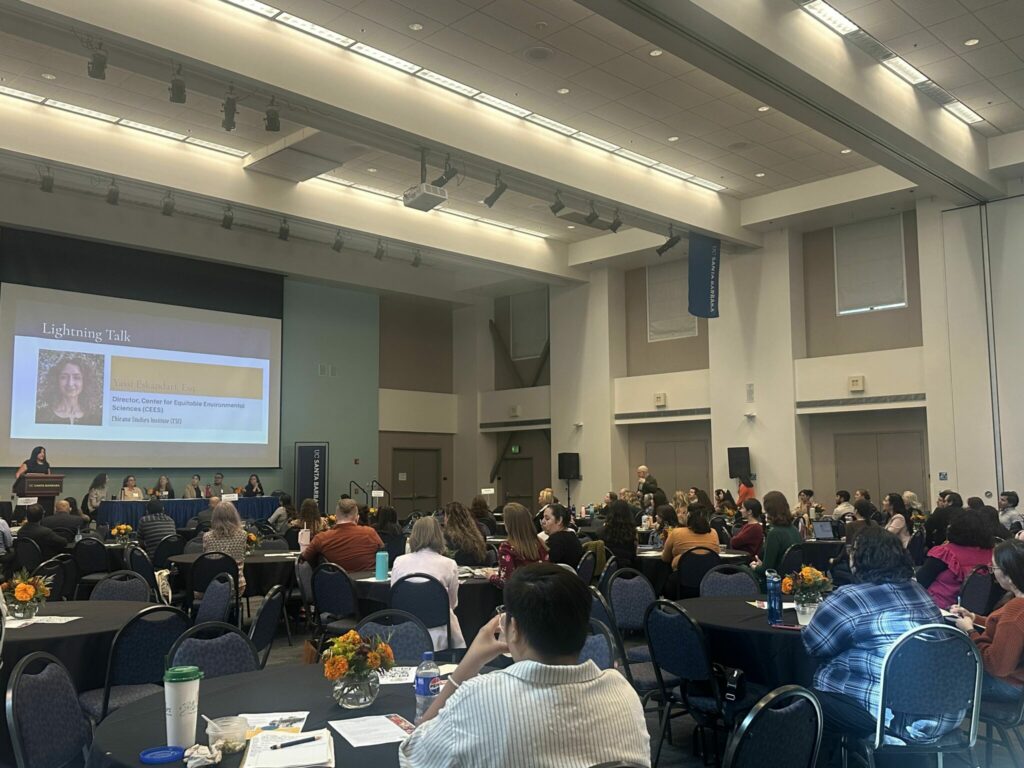Despite the loss of several federal discretionary grant funds, initiatives under UC Santa Barbara’s Hispanic-Serving Institution designation remain steadfast in their commitment to students, according to Hispanic-Serving Institution Director Veronica Fematt.

An HSI forum held last fall that included a panel discussion, grant showcase and multiple Q&A sessions. Alyssa Dabney / Daily Nexus
In September, the Department of Education (ED) ended discretionary funding for several grant programs within Minority-Serving Institutions, including those that are Hispanic-Serving, such as UCSB. In 2015, the ED designated UCSB as a Hispanic-Serving Institution (HSI) according to its criteria of being a non-profit campus with a full-time Hispanic undergraduate population of at least 25%.
According to Fematt, the elimination of these grants will primarily affect two HSI programs: Academy for Community-, Action-, and Use-Inspired Scholarship and Education (A-CAUSE) and Educational eXcellence and Inclusion Training Opportunities (ÉXITO).
A-CAUSE “engages in research, scholarship, and creative inquiry” according to the HSI website, and is based on the idea that participating in undergraduate research and internships helps increase retention rates and campus belonging. ÉXITO provides a pathway for students interested in becoming certified ethnic studies teachers, and is the first program of its kind within the University of California system, according to the HSI website.
Opening New Doors to Accelerating Student Success was originally funded by the ED, but when its five-year grant ended, the program was made permanent by the University. The initiative has its own center on campus and is dedicated to helping first-generation, income-eligible students who may be from underrepresented backgrounds.
“The elimination of federal HSI grants will limit the resources available to develop or expand initiatives that advance servingness,” Fematt said in an email statement to the Nexus. “These grants have played a crucial role in supporting programs that foster belonging and success for first-generation, income-eligible, and underrepresented students — not just Chicanx/Latiné students, which is a common misconception.”
However, Fematt emphasized that despite the repeal of these grants, several initiatives and events remain part of the University. Fematt highlighted the summer STEM Equity Institute as a recent initiative that remains on campus.
“As UCSB’s inaugural HSI Director, the work I have been leading — largely independent of the campus’s HSI grants — will continue,” Fematt said. “Over the past academic year, I have organized community-building events, conducted student surveys to better assess needs, coordinated career workshops and alumni panels, and created opportunities for faculty to engage in culturally relevant professional development.”
Fematt concluded by reiterating that although the University lost federal funding for these programs, UCSB will remain “deeply committed to servingness.”
“HSI grants helped us launch impactful programs, but our HSI initiatives extend far beyond funding cycles and serve our entire multicultural community,” Fematt said. “The work to foster belonging, elevate student voices, and support not only Chicane/Latiné students but all first-generation and underrepresented students will continue. Our mission as an HSI is institutional, enduring, and deeply rooted in equity and inclusion.”
A version of this article appeared on p. 1 of the Oct. 16, 2025 print edition of the Daily Nexus.




















